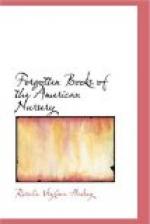From such records of parents’ care as are given in Mrs. Charles Pinckney’s letters to her husband’s agent in London, and Josiah Quincy’s reminiscences of his early training, it seems very evident that John Locke’s advice in “Thoughts on Education” was read and followed at this time in the American colonies. Therefore, in accordance with the bachelor philosopher’s theory as to reading-matter for little children, the bookseller recommended the “Fables” to “those concerned in the education of children.” It is at least a happy coincidence that one of the earliest books (as far as is known to the writer), aside from school and religious books, issued as published in America for children, should have been the one Locke had so heartily recommended. This is what he had said many years previously: “When by these gentle ways he begins to read, some easy pleasant Book, suited to his capacities, should be put into his Hands, wherein the Entertainment that he finds might draw him on, and reward his Pains in Reading, and yet not such as will fill his head with perfectly useless Trumpery, or lay the Principles of Vice and Folly. To this Purpose, I think Aesop’s Fables the best which being Stories apt to delight and entertain a child, may yet afford useful Reflections to a grown Man.... If his Aesop has pictures in it, it will entertain him much better and encourage him to read.” The two hundred pictures in Rivington’s edition made it, of course, high priced in comparison with Newbery’s books: but New York then contained many families well able to afford this outlay to secure such an acquisition to the family library.
Hugh Gaine at this time, as a rule, received each year two shipments of books, among which were usually some for children, yet about 1762 he began to try his own hand at reprinting Newbery’s now famous little duodecimos.
In that year we find an announcement through the “New York Mercury” that he had himself printed “Divers diverting books for infants.” The following list gives some idea of their character:
Just published by Hugh Gaine
A pretty Book for Children; Or an Easy Guide to the English Tongue.
The private Tutor for little Masters and Misses.
Food for the Mind; or
a new Riddle Book compiled for the use of
little Good
Boys and Girls in America. By Jack the Giant-Killer,
Esq.
A Collection of Pretty Poems, by Tommy Tag, Esq.
Aesop’s Fables
in Verse, with the Conversation of Beasts and Birds,
at their
several Meetings. By Woglog the great Giant.
A Little pretty Book,
intended for the Amusement of Little Master
Tommy and
pretty Miss Polly, with two Letters from Jack the
Giant-Killer.
Be Merry and Wise: Or the Cream of the Jests. By Tommy Trapwit, Esq.




